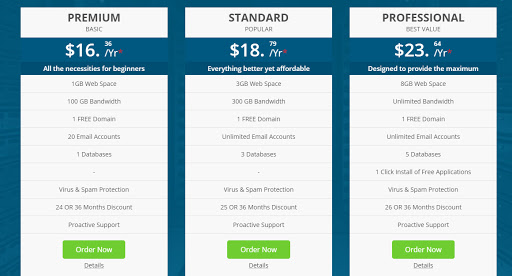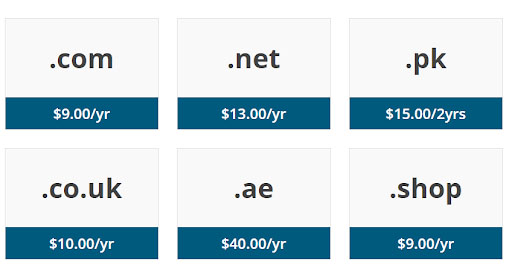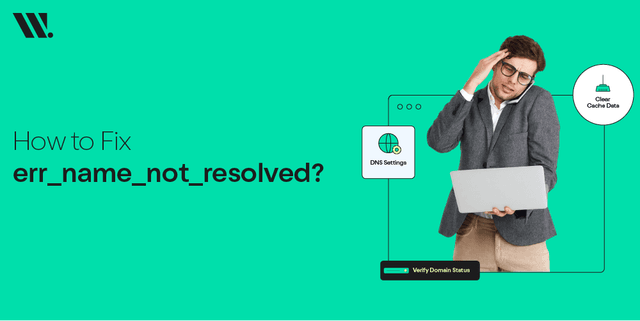It’s the era of technology, and all you really need to start a business and make it grow is a powerful online presence, even if you don’t have a physical store location.
Buying and registering a domain name is often the very first step to going online and it needs to be done perfectly.
As most experts would recommend, it’s best to pick a domain name that’s catchy, easy to remember, resonates with your brand identity, and tells your prospects a bit about the kind of services you provide.
You can even include a keyword or two in your domain name to define the content on your website and increase its exposure in search engines.
But choosing a domain isn’t all that’s required. You’d also want to pick a domain extension that suits your business in order to create a complete web address for your site.
More on this below!
What is a Domain Extension?
A domain name is central to your online presence and the extension you cap it off with would shape your visitors’ perception regarding your business.
Afterall, a domain name is the very first thing that your visitors see before they even get to your website.
Wondering what a domain extension is?
It’s the ending part of your domain – the short snippet of text that comes after the dot.
The first part of your domain, also known as the second-level domain, acts as a unique identifier of your website or signals your brand name.
Whereas, the last part, often referred to as domain extensions, top-level domain, or domain TLD signifies what your website is about.
For example, the websites of most educational organizations have domains that end with a .edu extension. Similarly, most business websites have a domain name with .com extension.
Together, the domain name and domain extension form a complete ‘address’ that your web visitors can type in their browsers in order to access your site.
Why are There So Many Different Domain Extensions?
While some TLDs have an obvious purpose, such as .org, .blog, .info, etc., others appear to be quite confusing when you first see them, like .gs.
Wondering why so many different TLDs exist?
Here are the functions that domain extensions are designed to complete:
- Aid in effective branding of a company, such as .realtor or .aarp.
- Indicate that a business operates in a certain country, such as .uk (United Kingdom), .ae (United Arab Emirates), and .pk domain extensions.
- Domain extensions that represent websites located in a certain geographical region, such as .asia.
- Restrict the usage of specific TLDs only to a certain group. Such as .edu.pk domain registration is only available for websites of educational institutions located within Pakistan. Similarly, .com.pk domain can be purchased only by commercial organizations and businesses operating in Pakistan. Ad .gov is restricted to be used only by government entities.
Types of TLDs
If you’re thinking of getting a domain name registered for your new website, it’s important for you to be familiar with certain types of domain extensions.
These are the three different types of TLDs you should know about:
1. Generic TLDs
These are the most commonly used domain extensions and are used by a huge number of businesses.
Generic or unrestricted domain extensions are available to anyone who wants to register a domain name. You don’t need to meet any specific criterion in order to be able to purchase a generic TLD, such as .co, .org, .net, and more.
Some hosting services providers may even allow you to register a .com domain name for free after you’ve bought a hosting plan from them.

2. Sponsored TLDs
Sponsored or restricted domain extensions can only be registered by organizations that fit a certain criterion. Such as, only a government organisation can register a domain name with .gov extension. Likewise, a .edu domain extension can be registered by only a certified educational institute.
3. Country Code TLDs
As mentioned earlier, the function of some domain TLDs is to denote that the website belongs to an organisation located within a certain country.
Domain extensions such as .de, .uk, and .pk domains help users in identifying that the website belongs to a company that operates locally.
Also, registering a country code top-level domain can be of immense help in getting the said website ranked on Google in a certain country.
For instance, if you happen to own a business in Pakistan and want more local customers to be able to view your website on Google’s Search Engine Result Pages, going for .pk domain registration can be your first step to higher rankings in local search results.
What are the Most Popular Domain Extensions?
As we’ve already discussed, the purpose behind creating different domain extensions was to divide websites into separate categories based on the type of organisations that owned those sites.
Today, there are more than 100 different domain extensions that you can get registered. The most popular choices include:
.com
This TLD stands for “commercial” and was first introduced to be majorly used by ecommerce sites. However, today almost half the websites online end with a .com extension.
The only issue with purchasing a .com domain is that the perfect domain name may be already taken.
Apart from that, .com is the most popular choice among business owners and is also quite cheap as compared to other TLDs.

.net
This is the second most common domain extension. The TLD stands for “network” an was originally created for websites of businesses that provide networking services, such as databases services, email services, and ISPs. However, similar to .com, .net has also occupied a lot of space on web over the past recent years.
.org
Initially made for use by non-profit organizations, a .org TLD can now be registered by anyone. However, it’s still most commonly used by charities, open-source software projects, educational services, etc.
.co
Introduced in the year 2010, .co stands for “corporation” or company. Similar to .net and .com, .co is also commonly used by online businesses.
Most business owners pair .co with a country code TLD, such as .co.pk.
.biz
Introduced as an extension to be used only by businesses and ecommerce websites, .biz is the least popular domain extension on this list. However, it’s also one of the cheapest ones.
Which Domain Extension Should You Choose?
When choosing a domain name and extension, it’s proper to go for an option that signifies and communicates the type of services you’re providing.
Here’s a list of factors you should consider when choosing a domain extension:
1. What’s the Purpose of Your Site?
A .com domain would be perfect if you want to run an online ecommerce store or a business website.
On the other hand, if you’re aimed at publishing blog posts only, go for a .blog or .biz TLD. In case the blog is for an organization, .org can work pretty well too.
Similarly, for the purpose of keeping an online journal, .me can be the perfect choice.
In a sense, your decision of choosing a domain extension should be informed by the purpose of your website.
2. What are the Local TLDs?
If you’re providing services in a specific geographical area, adding a country code TLD to your domain name can help with your rankings in the local search results and you’d be able to better target the local audience.
For example, a person who owns a business in Pakistan and is aimed at providing services within the nation, must look for the best .pk domain provider near them and buy a .pk domain for their website.
3. Would it Help with SEO?
If you’re hoping to generate good revenue with your website, then you must also aim to rank well in Google’s SERPs. So, choose a domain name and TLD that has a better chance of ranking high in search results when your prospective customers are searching the web for the kind of products or services you provide.
All in all, your domain name and the domain extension you purchase are two quite important choices that would determine your site’s future, the popularity it gains among your target audience, and the amount of revenue it helps generate each year. So, consider the type of services you’re offering and choose a domain extension accordingly.
Plus, don’t forget to complete your web address with a .pk domain extension if you own a business in Pakistan.






